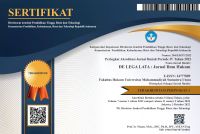The Idea of Implementing a District Election System as an Alternative for Simplifying Political Parties in Indonesia
Abstract
Keywords
Full Text:
PDFReferences
Assididiqie, J. (2002). Refleksi Hukum dan Konstitusi di Era Reformasi. Pusataka Bangsa Press.
Azed, A. B. (1987). Sistem Pemilihan Umum Indonesia. Jurnal Hukum dan Pembangunan, 17(2).
Budiardjo, M. (2008). Dasar-Dasar Ilmu Politik. PT. Gramedia Pustaka Utama.
Friedrich. (1967). Constitutional Government and Democracy: Theorie and practice in Europe and America. Waltham Mass.
Ghafur, J. (2019). Presidensial Thereshold. PT Citra Intrans Selaras.
Guan, Y., & Oktaviani, E. (2021). Meningkatkan Efisiensi Peradilan dalam Tata Cara Prosedural Litigasi Perdata Indonesia. De Lega Lata: Jurnal Ilmu Hukum, 6(2).
Hutabarat, R. (2005). Peranan Partai Politik Menyerap Aspirasi Masyarakat Dan Hukum Politik Yang Tidak Semantik. Jurnal Hukum Dan Pembangunan Universitas Indonesia, 11(3).
Ibrahim, J. (2008). Teori dan Metodologi Penelitian Hukum Normatif. Bayumedia.
Karim, R. (1983). Perjalanan Partai Politik di Indonesia. CV. Rajawali.
Lubis, T. H., & Koto, I. (2020). Diskursus Kebenaran Berita Berdasarkan Undang-Undang Nomor 40 Tahun 1999 Tentang Pers dan Kode Etik Jurnalistik. De Lega Lata: Jurnal Ilmu Hukum, 5(2).
MarzukiPeter Mahmud. (2014). Penelitian Hukum. Kencana.
Ramadhani, R. (2019). Jaminan Kepastian Hukum yang Terkandung dalam Sertifikat Hak Atas Tanah. De Lega Lata: Jurnal Ilmu Hukum, 2(1).
Santoso, T. (2019). Pemilu di Indonesia. Sinar Grafika.
Septian, I. F. (2019). Mengefektifkan Sistem Pemerintahan Dan Menyederhanakan Sistem Partai Politik: Belajar Kepada Pemilu Jerman. Majalah Hukum Nasional, 2.
Wiyono, R. (2019). Organisasi Kekuataan Sosial Politik di Indonesia. Alumni
DOI: https://doi.org/10.30596/dll.v7i2.10230
Refbacks
- There are currently no refbacks.
Address:
Faculty of Law, University of Muhammadiyah Sumatera Utara Jl. Kapten Mukhtar Basri No. 3 Medan, Kode Pos 20238
E-mail: delegalata@umsu.ac.id
Telp/HP/WA : 081262664567
DE LEGA LATA: Jurnal Ilmu Hukum is abstracting & indexing in the following databases:
De Lega Lata: Jurnal Ilmu Hukum is licensed under a Creative Commons Attribution-ShareAlike 4.0 International License.
Statcounter









